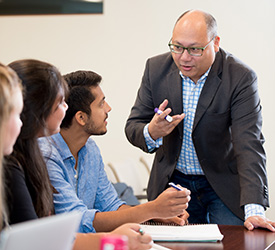Advising and Mentoring for Graduate Programs
 It is vital to the intellectual excellence and vitality of any program, to the successful inclusion of historically underrepresented groups in the academy, and to the launching of successful careers both within and beyond higher education.
It is vital to the intellectual excellence and vitality of any program, to the successful inclusion of historically underrepresented groups in the academy, and to the launching of successful careers both within and beyond higher education.
Though faculty advisors and graduate students form the advising relationship, graduate programs play key roles in cultivating moments for communication between faculty and graduate students, monitoring the advising taking place, and navigating challenges and misunderstandings in advising relationships. Programs provide relevant resources and information to support students and faculty advisors, set the stage for conversations about graduate advising, and develop systems for managing challenges in advising and student progress and addressing student and faculty concerns. In a sense, graduate programs establish the foundation and environment from which positive advising relationships may grow.
This being said, effective graduate advising at Brown is a team effort: faculty, graduate student, graduate program and the Graduate School all play roles.
Key Elements
- Provide an orientation at the beginning of the academic year.
- Ensure that faculty and students are well informed about program requirements and expectations as well as relevant University policies.
- Foster a culture of talking about advising.
- Develop advising and supervision structures that ensure that more than one faculty member is monitoring each student’s progress.
- Establish regular processes for reviewing student progress.
- Expect that problems will sometimes arise. Have structures in place in advance.
- Establish practices that foster communication between the faculty and the graduate students.
Resources for Graduate Programs
- Graduate Student Resources - Where to Start, Brown Graduate School
Provides a starting point for graduate student questions and resources on campus that can assist. - Who to Ask: Contacts for Graduate Programs, Brown Graduate School
Offers a list of Graduate School and other contacts to questions related to admissions and appointment process, dissertation completion process, and much more.
General guides for graduate departments and programs
From other institutions
- Expectations of Graduate Departments and Programs, Duke University Graduate School.
Provides general expectations and guides for role of graduate departments and programs. (Note some information in this document is specific to Duke). - Expectations for Graduate Education, Departments and Programs, Virginia Tech Graduate School (Note some information in this document is specific to Virginia Tech).
Provides general expectations and guides for role of graduate departments and programs.